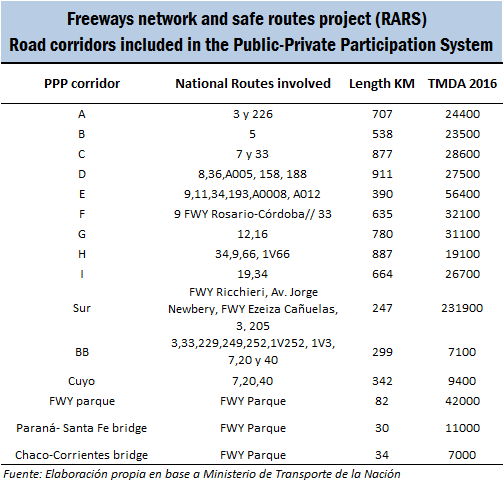The keys to develop cargo transport and logistics system in Argentina in the next 6 years. Part 1: roads.
JULIO CALZADA - ALFREDO SESÉ
The road system that serves to grain transportation to the ports located in the Rosario Hub, Bahía Blanca and Quequén might be improved in the next 6 years through the implementation of the Public-Private Participation System (Sistema de Participación Público-Privada, PPP). President Macri's administration implemented a National Road Plan with the aim of developing national road infrastructure. The middle term target is building 2,800 km of new freeways and 4,000 km of roads that would raise accessibility, improve safety and reduce logistic costs. According to the 2019 National Budget sent to Congress in September 2018, 356 km of new freeway have been completed and 1,553 km are under construction since President Macri took office in 2015. Plus, more than 5,096 km of the National Road Network have been pavemented and repaired, while 14,000 km are being improved. The Public-Private Participation System, introduced by law in 2016, seeks to encourage private investment to take part in several public strategic projects such as the National Road Plan development. The following table shows the national routes included in the PPP System, its length and total annual average daily traffic (TMDA) by 2016.
The first stage of the PPP System begun two years ago and covers 3,300 km of roads in the provinces of Buenos Aires, Córdoba, La Pampa, Mendoza and Santa Fe. It consists of 813 km of new freeways, 1,494 km of safer routes and 252 km of special works. According to official information, the estimated investment for the first six road corridors is US $ 8,000 million. In the first 4 years, US $ 6,000 million works will be executed and US $ 2,000 million complementary and maintenance works will be carried out during the following 11 years. How does the first stage of the Public-Private Participation System affect the road corridors that transport grain to the ports of Rosario Hub, Bahía Blanca and Quequén? The first stage of the PPP System covers six road corridors: A, B, C, E, F and Sur. These corridors are of crucial importance to transport grain from farms to factories and port terminals. Argentina's six major port nodes, in order of importance, are the Rosario Hub, Bahía Blanca, Quequén, Ramallo, Zárate and Villa Constitución/San Nicolás. In 2017, near 90 MT of grains, meals and oils arrived at Argentina's six major ports according to our estimates by truck, rail and barges. Ports located in the Rosario Hub receive around 79% of the total cargo arriving at Argentine ports. Last year, about 71 MT of grains entered the Rosario Hub, 56 MT of which arrived by truck. This implies about 2,000,000 trucks heading to these ports throughout the year. The port of Bahia Blanca received near 9.1 MT of grains, of which 6.3 MT arrived in 228,000 trucks. As for the port of Quequén, about 6 MT of grains, meals and oils arrived by truck (215 thousand vehicles); 2.4 MT trucks arrived at the port of Zárate; while the port of Ramallo received about 940,000 tons, and the port of Villa Constitución/San Nicolás received 450,000 tons. Road corridors A, B and Sur are crucial to grain transportation towards the port of Bahia Blanca and Quequén, while C, E and F road corridors serve to the ports in Rosario Hub. Public-Private Participation System's first stage aims to improve road safety, lower heavy vehicles' operating costs and shorten travel times. There are several improvements taking place in corridors C, E and F, the most relevant corridors for the Rosario Hub area. National Route A 012 that connects port terminals and industrial plants of southern and northern Rosario Hub will become a freeway. Moreover, a third lane will be constructed on the Buenos Aires-Rosario freeway between Zárate and Baradero. National routes No. 11 and No. 33 will be modernized in order to distribute traffic more efficiently in the Rosario Hub accesses. The highway of National Route N°33 Finally, regarding the project's financing, the Government is currently trying to establish a trust that would involve the Investment and Foreign Exchange Bank (BICE) in order to channel private financial entities loans.
